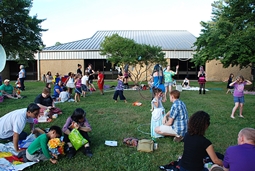Australian Libraries are ready to talk about the next steps to be seen as an active force in the delivery of the UN Sustainable Development Goals (SDG) 2030 in Australia and the Asian-Pacific region. Led by Vicki McDonald, Chair, ALIA International Relations Advisory Committee who is also who is also IFLA Professional Committee Chair and member of the IFLA Governing Board some 20 library leaders and other representatives from the Federal Government came together at Australian Library Information Association (ALIA) House in Canberra on 23rd September, 2019. This roundtable came together to debate stretch targets for the library sector to define and measure our actions.
The draft targets fit with the 17 SDG goals and 169 SDG targets and are divided into three sections:
- Priorities for Australian library services
- Contribution to society
- Global citizenship
As with the global goals, the draft library targets that are currently out for consultation are ambitious, yet achievable. The targets developed are designed to be measurable, using qualitative and quantitative methods, and by assessing impact. Importantly they are not new and all build on the existing library agenda.
The draft library targets also define the library sector’s role for each of the SDG goals and targets identified for our sector’s action. The roles are fourfold.
- Advocacy: Libraries of all types have a voice and this action plan defines how Australian Libraries, our Associations and industry partners can raise our voice and be heard. Key pieces of legislation, open access initiatives, and raising the profile of the debate in areas such as copyright and open access are key measures.
- Service Delivery: there are key aspects of the SDG targets where libraries can directly make a substantial impact with their actions, which can be amplified with further guaranteed funding. Areas such as digital inclusion, access to information, increased digital presence, and digital access to collections are just a few. The measures identified for this type of role include case studies, existing quantitive measures and identifies where the sector needs to gather new data.
- Research and Advocacy: Our sector needs to make the case for the impact of libraries to deliver benefits in all aspects of society. A key area identified for this research is school libraries and teacher librarians. Making a case for their important and essential inclusion in the educational experience of young Australians is a priority.
- Management: For those SDG targets and actions identified where libraries are in control and deliver, the core role is defined as management. Here libraries can lead the way. Whether it be in environmental sustainable practices, green design for new library buildings, increased collaboration, or cultural diversity and gender equity these are areas where the sector can lead. Measures include existing data, case studies and showcasing best practice.
Using the indicators and measures described within each target, the intent is to create a statement of the starting point in 2020-2021, an interim position in 2024-2025 and a final position in 2029-2030.
SDG 17 is ‘partnerships for the goals.’ Cross-sector collaboration and partnerships are threaded through this discussion paper and new alliances will be identified as part of the next steps. Our sector will want to work with all three levels of the Australian government, including Arts, Education, Health, Foreign Affairs and Trade; with LIS associations in the region and globally; with GLAM (gallery, library, archives and museum) colleagues; with library suppliers; with LIS researchers and with agencies such as the Australian Bureau of Statistics and the Australia Council for the Arts.
A discussion paper has been circulated to the library sector for comment until 3 January 2020. All feedback will be analysed and an executive group of the ALIA International Relations Advisory Committee will produce confirmed stretch targets for the LIS sector with a report scheduled for publication by the end of March 2020.
Following this there will be an investigation into the current position in the LIS sector against the stretch targets, which is planned to be published in the third quarter of 2020 and will set the baseline for further measurement. An action plan will also be developed and annual updates from 2021 onwards will be put in place. It is expected that major reports will be published in 2025 and 2030 identifying where goals have been completed, where stretch targets are on track and where there is a need for increased focus. For more information and links to the reports and discussion paper see the ALIA website https://www.alia.org.au/advocacy-and-campaigns/think-global-act-local
So watch this space for more updates on how Australian Libraries are delivering on the SDGs.
Jane Cowell, Chief Executive Officer, Yarra Plenty Regional Library, Australia



